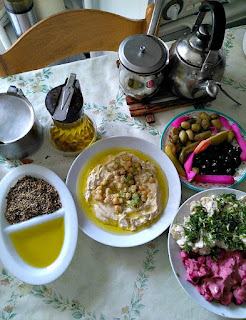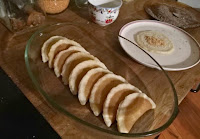 |
| Suhur (dawn) mea |
– by Katie –
We wake up before dawn, when there is a red line on the horizon, to the sound of the birds, Imsak, the call to prayer preceding dawn, or more realistically, the alarm clock. It’s time for suhur, or the morning meal during Ramadan. With eyes barely open, I stumble my way to the kitchen and find a table of wholesome, filling foods, to get us through the day ahead. Each family is different, but you can typically find an assortment of delicious Arab foods, such as hummus, and falafel, avoiding sweet and salty things as much as possible. At fajr, the next call to prayer, observants stop eating, and begin their fast of food and beverage until the sun sets.
During the day, Ramallah is quieter than usual. People walk a little slower, and try to stay out of the sun, since drinking water is not permitted during the fasting period. Cafes and restaurants are closed, but shops and markets are open so people can shop for their evening meal necessities.
As the sun lowers in the sky, people fill the streets buying fruits, vegetables, fresh falafel, and all kinds of Ramadan sweets for iftar, the sunset meal which breaks the fast. Half an hour before sunset, the shops close, and the streets empty, and Ramallah becomes a ghost town, as the residents of Ramallah head home for iftar. Surrealistically
At home, food is prepared and placed on the table as the family and friends gather to eat. We wait for the sunset call to prayer, al Maghreb, to signal that the fasting period has ended, and we may begin. Personally, I go immediately for a glass of water, and a few dates. Others choose to start with milk, or yogurt and dates, or just skip right to the soup. Soup is served first as it begins to re-hydrate the body from hours without water. After the soup prepares the stomach for more food, we continue eating our evening meal.
As iftar is a bit of a celebration everyday, the meal is always special, and with many components. People tend to eat a main course, of spiced meat and rice, or a vegetable stew, along with salads, bread, dips like hummus, or baba ghanoush, fried snacks, like falafel and whatever else was picked up that day to eat.
After fasting, the food tastes incredible and I savor each bite. Oddly enough, I am full after eating a small amount, and we sit around the table for awhile chatting, and watching the nightly Ramadan TV programming. Throughout the night, people come and go into the kitchen snacking and drinking water, to prepare for the next day’s fast.
 |
| Katayef |
Several hours after iftar, we prepare qatayef, a traditional Ramadan sweet, that is basically a pancake filled with nuts or cheese, then fried, and dipped in sweet honey syrup. We stuff the pre-made dough with roasted walnuts and coconut, then squeeze the edges shut creating a stuffed crescent moon shape, the classic symbol for Ramadan, as the holy month begins on the new moon. Warm qatayef is the perfect midnight snack before heading to bed for a few hours, to wake up for suhur, and start over again.
But Why Fast?
Religious or not, many people fast out of cultural, and family norms and practices. If no one around you is eating or drinking, it almost feels strange to eat or drink. Plus, the family iftar is a nice communal event, and almost everyone, fasting or not, participates in an evening iftar.
Religiously, fasting is one of 5 pillars of Islam, next to prayer, faith, charity, and haj (pilgrimage to Mecca). Muslims would tell you a variety of benefits they get from fasting, with the main intention of deepening their spirituality, and get closer to Allah, God. Refraining from meals during the day can bring people more empathy with the poor and starving around the world, and observants are able to practice patience and discipline in a direct manner.
Ramadan Travel in the Occupied Territories
Unlike many others celebrating Ramadan in countries around the world, the people of Ramallah, in the West Bank, observe under the occupation of Israel. Though occupation imposes all sorts of day to day difficulties and injustices, one thing that occupation means is that West Bank residents are not free to travel across the rest of the country without a permit. The holy prayer site, the al-Aqsa Mosque located in Jerusalem, is not accessible regularly to West Bank Palestinians. This year permits were issued during Ramadan, so Muslims can pray at the holy site during their most holy month, and Palestinians can visit and family in Israel.
During Ramadan, checkpoints have shockingly long lines, even longer than usual, as soldiers check and verify each person coming through the checkpoint. Palestinians wait at Qalandia, one of the main checkpoints, for hours on end. In hopes to escape the long waits, some people take public shuttles, called service, and head to other checkpoints hoping for a shorter wait time and entry into the Israeli controlled Jerusalem. If all goes well, Palestinians cross over before sunset, in time to pray, or break their fast.
The Less Spiritual Side of Ramadan in Ramallah
But not everyone in Ramallah fasts during Ramadan; some people are exempt, such as pregnant, nursing, or menstruating women, and those who are not religious or just choose not to fast, or the many foreign residents living in the city.
In the early days of the holy month, which started at the end of May, there were several incidents involving a few individuals publicly eating, some with the intention to incite and torment the fasters, and others wanting to make a protest statement against the domination of the religious rules deeply rooted in the culture.
In response, the police Chief, inspired by a similar Jordanian law, issued a statement and a warning that those caught eating in public out of disrespect would be arrested and imprisoned for one month. And even since the warning, there have been a few cases of arrest, and detention.
Another interesting aspect shared with me was the apparent commercialization of the holy month. People tend to over consume in several ways. Food becomes an obsession, and often an over indulgence. There are also many lavish parties that last the whole night, and families often take luxuries vacations. Leading up to the end of Ramadan, towards the high holy day of Eid al-Fitr, people buy many gifts for friends and family, and it has almost become a competition among some, to outspend the others.
But after all, everyone celebrates and participates in their own way, and has their own family traditions. I’d love to hear more from you:
Do you fast for Ramadan? What are some of your favorite Ramadan meals, and traditions? What benefits do you get from fasting? Do you think that arresting those eating in public, is over the top, or that it is well deserved? Do you think that Ramadan has been commercialized?



Comment (0)